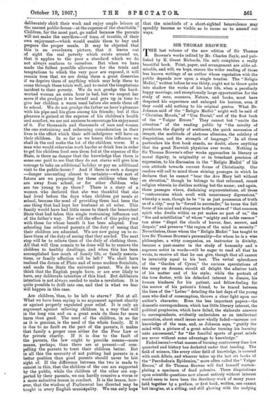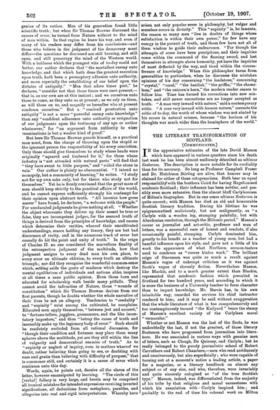SIR THOMAS BROWNE.
THE last volume of the new edition of Sir Thomas Browne's works (edited by Mr. Charles Sayle; and pub- lished by E. Grant Richards, 15s. net) completes a really beautiful book. Print, paper, and arrangement are alike ad- mirable, and will, we hope, ensure the wider reading of those less known writings of an author whose reputation with the public depends now upon a single treatise. The " Religio Medici," written before he was thirty, ought not to throw quite into shadow the works of his later life, when a peculiarly happy marriage, and exceptionally large opportunities for the study of men, manners, Nature, and books, must have deepened his experience and enlarged his horizon, even if they could add nothing to his original genius. What Dr. Johnson said of the " Religio Medici" might well be said Of "Christian Morals," of "Urn Burial," and of the first book of the "Vulgar Errors." They cannot but "excite the attention" of the reading public by "the novelty of paradoxes, the dignity of sentiment, the quick succession of imageS, the multitude of abstruse allusions, the subtlety of disquisition, and the strength of language." In all these particulars his first book stands, no doubt, above anything that the great Norwich physician ever wrote. Nothing in Sir Thomas Browne's other works approaches in literary or moral dignity, in originality or in trenchant precision Of expression, to his discussion in the " Religio Medici" of his own attitude towards current forma of Christianity. Our readers will call to mind those shining passages in which he declares that he cannot "hear the Ave Mary bell without an elevation," though he belongs to that reformed, recast religion wherein he dislikes nothing but the name; and again, those passages where, disdaining argumentations, all those "controversies which swell with unnecessary digressions," whereby a man, though he be "in as just possession of truth as of a city," may be "forced to surrender," he turns the full force of his mind and eloquence tothe praise of "that common spirit who dwells within us yet makes no part of us," the "fire and scintillation" of whose "mighty and noble essence" can alone "dispel the clouds of horror, fear, sorrow, and despair," and preserve "the region of the mind in serenity." Nevertheless, those whom the " Religio Medici" has taught to love Sir Thomas Browne's personality—for whom he is a wise philosopher, a witty companion, an instructor in divinity, because a past-master in the study of humanity and a supreme artist in' words—will be eager to read all that he wrote, to receive all that he can give; though that all canna be invariably equal to his best. The verbal splendours of the "Garden of Cyrus," the curious speculations of the essay on dreams, should all delight the admirer both Of his matter and of his style ; while the portrait of the true doctor, with his detached interest in disease, his human kindness for his patient, and fellow-feeling fOr the sorrow of his patient's friend, to be traced between the lines of the " Letter " detailing the last days of the young man who died of consumption, throws a clear light upon our author's character. Even the less Important papers—the domestic correspondence, which has little literary interest, the political prophecies, which have failed, the elaborate answers to correspondents, evidently undertaken as an intellectual recreation, about small issues now wholly faded—increase our knowledge of the man, and, as Johnson says, "gratify the mind with a picture of a great scholar turning his learning unto amusement," for "the fanciful sports of great minds are never without some advantage to knowledge."
Faded issues !—what masses of burning controversy time has quenched and history has docketed under that beading. The field of science, like every other field of knowledge, is covered with such debris, and whoever takes up the last six books of the "Pseudodoxia Epidemics," more often called the" 'Vulgar Errors," of Sir Thomas Browne will find himself contem- plating a specimen of dead polemics. These disquisitiops upon scientific questions now almost entirely without interest would seem to have been the desultory work of many years held together by a preface, or .first book, written, one cannot but imagine, at a sitting, and still glowing with the undying genius of its author. Men of his generation found little scientific truth ; but when Sir Thomas Browne discussed the causes of error, he turned from Nature without to the mind of man within. In that region he knew his way, and even if many of his readers may differ from his conclusions—and those who believe in the judgment of the democracy must differ—the questions he discussed are still burning, and still open, and still preoccupy the mind of the Western world. With a boldness which the youngest wits of to.day could not better, our author declares that "the mortallest enemy unto knowledge, and that which bath done the greatest execution upon truth, Lath been a peremptory adhesion unto authority, and more especially the establishing of our belief upon the dictates of antiquity." "Men that adore times past," he declares, "consider not that those times were once present,— that is, as our own are at this instant ; and we ourselves unto those to come, as they unto us at present ; as we rely on them, so will those on us, and magnify us hereafter who at present condemn ourselves." But a " resolved prostration unto antiquity" is not a more "powerful enemy unto knowledge" than any "confident adherence unto authority or resignation of our judgments upon the testimony of any age or author whatsoever," for "an argument from, authority to wiser .ixaminations is but a weaker kind of proof."
But here Sir Thomas Browne guards himself, as a practical man must, from the charge of throwing upon the stupid or the ignorant person the responsibility of his every conviction. Only those should give themselves to study whose heads were originally "squared and timbered for it," for those whose industry is "not attended with natural parts" will find that "they have sweat to little purpose," and "rolled the stone in vain." Our author is plainly no obscurantist. "I intend no monopoly, but a community of learning," be writes. "1 study not for my own sake only, but for theirs who study not for themselves." Yet he is firmly convinced that the great mass of men should keep strictly to the practical affairs of the world, and he cannot express sufficiently strongly his contempt for their opinion upon abstract truth. "All heresies how gross soever " have found, he declares, "a welcome with the people." For uneducated judgments be gives nothing at all. "Whether the object whereunto they deliver up their assent be true or . false, they are incompetent judges, for the assured truth of things is derived from the principles of knowledge, and causes which determine their verities, whereof their uncultivated understandings, scarce holding any theory, they are but bad discerners of verity, and in the numerous track of error but casually do hit the point and unity of truth." In the reign of Charles II. no one considered the marvellous finality of the retrospective judgment of the multitude, how that judgment assigns to every dead man his own place, to every error an ultimate oblivion, to every truth an ultimate triumph ; nor did they recognise the wonderful common-sense which, setting aside the gusts of madness which destroy the mental equilibrium of individuals and nations alike, inspires at all times a sane public opinion. Even those born and educated for scholarship walk beside many pitfalls. They cannot avoid the infirmities of Nature, those "wounds of constitution" which Sir Thomas Browne derives from our first parents, though he doubts whether the whole narrative of their lives be not an allegory. Tendencies to " credulity " and " supinity " exist among the cultivated, be complains. Educated men apply themselves, "between jest and earnest," to "fortune-tellers, jugglers, geomancers, and the like incan- tatory impostors," and thus "betray the cause of truth and insensibly make up the legionary body of error." Such should be resolutely excluded from all rational discussion, for "though their condition and fortunes may place them many spheres above the multitude, yet are they still within the line of vulgarity and democratical enemies of truth." As to supinity or neglect of inquiry, even in matters whereof we doubt, rather believing than going to see, or doubting with ease and gratis than believing with difficulty of purpose," that is commoner still, and certainly it is a cause of error which continues unto this day.
Words, again, he points out, deceive all the slaves of the letter, however emancipated by learning. "The circle of this [verbal] fallacy is very large, and herein may be comprised all ironical mistakes for intended expressions receiving inverted significations, all deductions from metaphors, parables, and allegories into real and rigid interpretations. Whereby have arisen not only popular error in philosophy, but vulgar and senseless errors in divinity." This " supinity" is, he laments, the reason so many men "live in doubts of things whose satisfaction is within their own power," for few have any energy in the pursuit of truth, and those few have not all of them wisdom to guide their endeavours. "For though the attempts of some have been precipitous, and their inquiries come within the command of the flaming sword, and lost themselves in attempts above humanity, yet have the inquiries of most deflected by the way, and tired within the circum- ference of knowledge." When this philosopher turns, from generalities to particulars, when he discusses the mistaken opinions of his day concerning "the loadstone," concerning "crystal," "coral," "the basilisk," "the griffin," "the chame- leon," and "the unicorn's horn," the modern reader ceases to follow him. Time has turned his corrections into new mis- takes, and still newer corrections are no longer accepted as truth. "A man very inward with nature," said a contemporary critic. "A man very inward with human nature," corrects the critic of to-day, the worth of whose wisdom was not abated by his errors in natural science, because "the horizon of his thoughts was much wider than the hemisphere of the world."











































 Previous page
Previous page